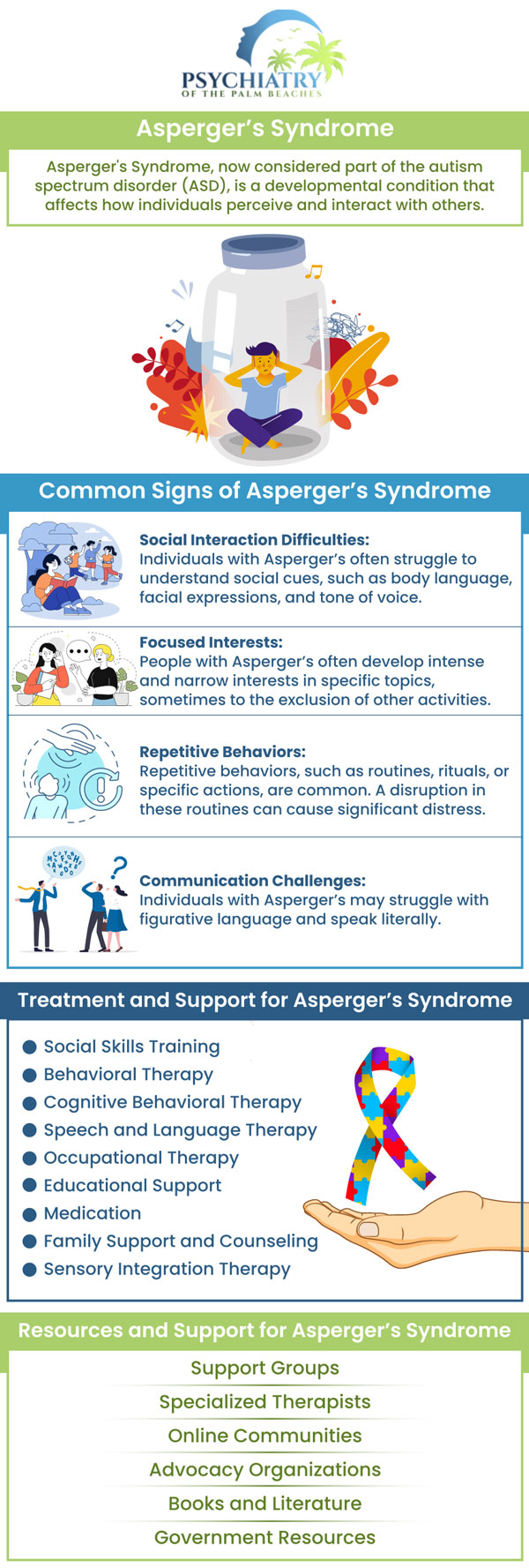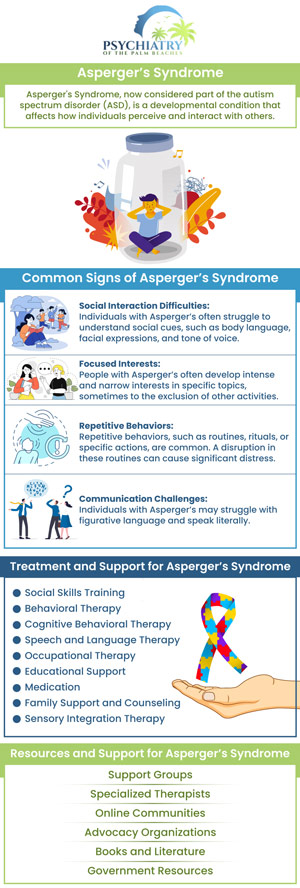Asperger’s Syndrome Treatment Clinic in Port St. Lucie, FL
At Psychiatry of the Palm Beaches, we provide specialized treatment for Asperger’s syndrome in Port St. Lucie, FL. Our team offers personalized care to address the unique challenges of individuals with Asperger’s syndrome, focusing on improving social skills, communication, and emotional regulation. For more information, contact us today or book an appointment online. We are conveniently located at 266 NW Peacock BIvd Suite 203 Port St. Lucie, FL 34986.


Table of Contents:
What are some common misconceptions about treating Asperger’s syndrome?
How does self-advocacy play a role in Asperger’s syndrome treatment?
Can Asperger’s syndrome be managed without professional help?
Can Asperger’s syndrome treatment involve social groups?
There are a number of common misconceptions involving the treatment of Asperger’s syndrome. One common misconception is that treatment aims to eliminate autistic traits entirely rather than focusing on supporting the individual’s strengths and addressing specific challenges. This misunderstanding can lead to unrealistic expectations and a narrow view of what treatment can accomplish. In reality, the goal is often to help individuals navigate daily life more effectively, build on existing abilities, and develop strategies for situations they find difficult. Each treatment plan is highly individualized, reflecting the fact that no two individuals with Asperger’s experience the condition in the same way.
Another misconception is that medication alone can address the needs of someone with Asperger’s syndrome. While certain medications may help manage co-occurring symptoms such as anxiety, depression, or attention-related difficulties, they are not a replacement for therapeutic approaches. A balanced plan often combines medical care with therapies such as speech and language support, social skills training, or cognitive behavioral interventions. Without this combination, the individual may not receive the tools needed to address core social, sensory, or communication challenges.
Some people also believe that individuals with Asperger’s syndrome cannot make meaningful social connections, regardless of treatment. This assumption overlooks the impact that targeted therapy, patient-centered support, and consistent practice can have on interpersonal skills. Many individuals build close relationships once they are given opportunities to understand social cues in ways that align with their learning style. Long-term support, even if less intensive over time, can help maintain and build on these gains.
Self-advocacy allows individuals with Asperger’s syndrome to communicate their needs, preferences, and boundaries in a clear and confident way. Developing this skill can help reduce misunderstandings and improve interactions in academic, professional, and personal settings. Learning to express needs effectively often begins with structured therapy sessions that focus on building awareness of one’s strengths and challenges. Over time, individuals can apply these skills independently in real-world situations. In treatment, self-advocacy may involve teaching individuals how to request accommodations, clarify instructions, or explain personal communication styles to others. This process can be especially beneficial in environments where expectations are not explicitly stated, such as workplaces or group activities. Role-playing and scenario-based practice can help individuals prepare for these moments so they feel more comfortable addressing them when they arise. The process reinforces both confidence and self-awareness, which are essential for long-term success. Self-advocacy also supports emotional well-being by giving individuals a sense of agency in their treatment and daily life.
The specialists at Psychiatry of the Palm Beaches incorporate self-advocacy development into treatment when appropriate to enhance independence and resilience. By encouraging individuals to take an active role in communicating their needs, treatment becomes more personalized and adaptable to different stages of life.
Some individuals with Asperger’s syndrome may develop their own coping mechanisms over time, relying on personal research, family support, or trial and error. These approaches can be beneficial in certain cases, especially when the individual has a strong support system and is highly self-aware. However, professional guidance can provide tools, perspectives, and resources that may be difficult to access independently. Structured therapies and medical care can address needs that are not always apparent without specialized assessment.
Without professional support, progress in areas such as communication skills, sensory regulation, or emotional management may be slower or less consistent. Families and individuals may struggle to identify which strategies are truly effective and which are creating additional challenges. Therapists, occupational specialists, and other trained professionals can evaluate the individual’s needs in a more targeted way and suggest interventions that are evidence-based.
At Psychiatry of the Palm Beaches, individuals have access to a multidisciplinary approach that combines medical care with therapeutic services. This collaborative model can be especially valuable for those who have been managing on their own but are ready to expand their toolkit for navigating challenges.
Social groups can play an important role in treatment by giving individuals with Asperger’s syndrome the opportunity to practice skills in a structured yet supportive environment. These groups often focus on areas such as conversation flow, reading social cues, and managing group dynamics. The environment is designed to encourage interaction while minimizing the social pressures that can arise in less controlled settings. This can make practicing new skills feel more manageable and rewarding. Participation in social groups can also help individuals build a sense of community. Meeting others with similar experiences can provide reassurance and reduce feelings of isolation. Group members often share strategies for handling challenges, offering practical advice alongside emotional support. This exchange can be just as valuable as the structured learning that takes place during group sessions.
The specialists at Psychiatry of the Palm Beaches may recommend social groups as part of a comprehensive care plan when they align with the individual’s goals and needs. These groups can be tailored to different age ranges and ability levels, ensuring that participants are working within an environment that supports growth. By combining social practice with other therapeutic approaches, individuals can strengthen their confidence and improve their ability to navigate a variety of interpersonal situations.
Improving Life with Asperger’s Syndrome: Treatment by Our Team
At Psychiatry of the Palm Beaches, our team provides effective treatment for Asperger’s Syndrome, focusing on developing social skills, managing emotions, and improving relationships. Through a personalized approach, our team supports individuals with Asperger’s to improve their quality of life and achieve greater success in social and personal environments. Feel free to contact us directly to address your concerns or schedule an appointment online for a consultation. Our team is here to provide the support and care needed to overcome depression and reclaim a sense of well-being. We are conveniently located at 266 NW Peacock BIvd Suite 203 Port St. Lucie, FL 34986. We serve patients from Port St. Lucie FL, Beau Rivage West FL, River Park FL, Fort Pierce FL, Lakewood Park FL, and surrounding areas.
Check Out Our 5 Star Reviews



Additional Services You May Need
▸ Mental Wellness
▸ Relationship Coaching
▸ Depression and Mood Disorders
▸ Women’s Health
▸ Panic Disorder
▸ Medications Management
▸ Men’s Health
▸ Individual Psychotherapy
▸ Bipolar
▸ ADHD
▸ Geriatric Mental Health
▸ Couple’s Counseling
▸ Obsessive Compulsive Disorder
▸ Social Phobia Treatment
▸ Eating Disorders
▸ Post Traumatic Stress Disorder
▸ Psychotic Disorders


